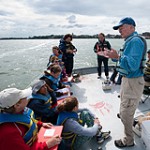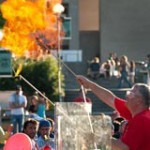Category Science & Technology
Curiosities: Does a dark-colored car heat up more in the sun than a light-colored car?
The external color does not significantly affect how much the inside of a car heats up in the sun, says Sanford Klein, director of…
Curiosities: Why do cats hate water?
Because we teach them to hate it. There are plenty of cats that love water, according to Sandi Sawchuk, a clinical instructor at the…
Curiosities: Why do onions make us cry when we cut them?
Chopping onions unleashes a “chemical defense that onion plants have to protect themselves against insects and microbes,” says UW–Madison horticulture professor Irwin Goldman. We’re…
Curiosities: Are there more geese in Wisconsin than there used to be?
The number of Canada geese in Wisconsin is very much on the rise, increasing exponentially since standardized bird counts began in 1966, according to…
Faculty aim to strengthen technology, science education by blending them
A group of UW–Madison researchers and Thermo Fisher Scientific scientists will bring together high school students and teachers to build and use diagnostic equipment that would not be out of place in university research labs.
UW-Madison symposium addresses science’s holiest grail: building life from scratch
While at the University of Wisconsin–Madison, biochemist Har Gobind Khorana helped crack the genetic code, completing a set of experiments that garnered him a Nobel Prize in 1968.
Software tool helps Web developers identify seizure-causing content
In 1997, an episode of the popular Pok�mon cartoon gained worldwide attention when more than 800 Japanese children with photosensitive seizure conditions were admitted to the hospital after viewing the cartoon or the subsequent news coverage of it.
Do Chicago’s suburbs hold the key to understanding West Nile virus?
For a group of UW–Madison epidemiologists, the Chicago suburbs near Oak Lawn are proving to be the perfect laboratory for prying loose the secrets of West Nile virus, a pathogen carried by mosquitoes and birds that infects and sickens thousands of people each summer.
Slide show: Blooming limnologists
The limnology “major”, one of 18 offered at this year’s Grandparents University, takes grandparents and their grandchildren on to Lake Mendota to collect samples and test the water for oxygen and temperature while aboard Limnos, a 28-foot research boat.
‘Motion picture’ of past warming paves way for snapshots of future climate change
By accurately modeling Earth's last major global warming - and answering pressing questions about its causes - scientists led by University of Wisconsin–Madison and National Center for Atmospheric Research climatologists are unraveling the intricacies of the kind of abrupt climate shifts that may occur in the future.
Study suggests H1N1 virus more dangerous than suspected
A new, highly detailed study of the H1N1 flu virus shows that the pathogen is more virulent than previously thought.
UW-Madison researcher wins White House science award
A University of Wisconsin–Madison bacteriologist and evolutionary biologist is one of the country's brightest young scientific minds, according to the White House.
Reduced diet thwarts aging, disease in monkeys
The bottom-line message from a decades-long study of monkeys on a restricted diet is simple: Consuming fewer calories leads to a longer, healthier life.
Registration now open for Wisconsin Science and Technology Symposium
The second annual Wisconsin Science and Technology Symposium, to be held July 23 and 24, will bring together science and technology researchers, entrepreneurs, and investors from across the state to help them share ideas and spark new collaborations.
Five big ideas to fill out Wisconsin Institute for Discovery portfolio
Capping an intensely competitive process, five proposals from University of Wisconsin–Madison faculty have been selected to form the intellectual heart of the Wisconsin Institute for Discovery (WID).
Recent sightings: The science of fireworks
Chemistry professor Bassam Shakhashiri ignites a gas-filled balloon during a free demonstration about the science of fireworks held at the University of Wisconsin–Madison’s Memorial…
New MRI technique could mean fewer breast biopsies in high-risk women
A University of Wisconsin–Madison biomedical engineer and colleagues have developed a method that, applied in MRI scans of the breast, could spare some women with increased breast cancer risk the pain and stress of having to endure a biopsy of a questionable lump or lesion.
Sequencing effort to chart ants and their ecosystem
Nestled within the twisting fungus gardens of leaf-cutter ants exists a complex symbiotic web that has evolved over millions of years. Now, with the help of a major genomic sequencing grant from Roche Applied Science, scientists at UW–Madison will be able to analyze these interactions at the molecular scale.
Major study links malaria mosquitoes to Amazon deforestation
In one of the most field-intensive efforts to explore the connection between malaria and tropical deforestation, a team led by Jonathan Patz, a specialist in the link between environment and health at the Nelson Institute for Environmental Studies at UW–Madison, has established a strong correlation between the extent of forest destruction and the incidence of the Amazon's most dangerous malaria vector, the mosquito Anopheles darlingi.
Students help New Orleans wetlands
A project led by students at UW–Madison and designed to restore New Orleans wetlands damaged by Hurricane Katrina recently took a major step forward.










